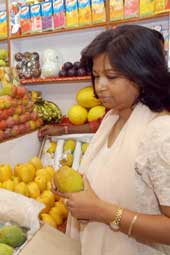 |
| A customer buys mangoes. Picture by Ashok Karan |
Ranchi, April 27: Blame the recent hailstorm for the lack of mangoes this season.
The storm is said to be responsible for the increase in prices to hit the mango market, thereby putting a limit to the number of people who will get to enjoy the juicy fruit.
It was expected that there would be a boom in mango production, but horticulturists predict that production will decrease by 20 to 25 per cent and prices will increase from Rs 30 per kilo to Rs 80 per kilo because of the hailstorm.
Mangoes will have to be brought in from Bihar ? apart from southern India, the regular supplier of mangoes to the state ? to meet the demand.
Jharkhand produces 11.88 tonnes of mangoes per hectare.
S.S.P. Singh, deputy director of the horticulture said mango production in the state took place every other year.
It was expected that more mangoes would be available this year, as there was less last year (last year?s demand was met by mangoes from Bihar and the south).
?But the hailstorm has spoilt everything. Mangoes are grown in the south every year, so the production is higher there,? said Singh.
The deputy director said that Jharkhand grows less mangoes than Bihar. The state?s major mango belts are Deoghar and Dumka.
?The cost of the mangoes might soar from Rs 30 to Rs 80 per kg. In Jharkhand, the mangoes are also brought from Bhagalpur, Darbhanga, Muzzfarpur and Sahebganj,? said Singh.
Although the market is flooded with different varieties of mangoes from Chennai, such as Gulab Khas, Balcoman, Mithu, Rasaloo, Baigan Pilli and Alphonso, there are few buyers even though the mangoes are being sold at Rs 30 to Rs 50 per kg.
The most sought after mango, ?Alphonso? grown in Maharashtra costs Rs 280 (per dozen) which comes in a packet.
Kumar, a mango seller near Kutchery Pawan, said sales had not really picked up this year.
Md Nasim, who sells mangoes at Daily Market, said the mango season in Jharkhand would only begin in May.
?Sales start picking up when mangoes are brought from local areas such as Simdega, Tapkara, Jonha. We don?t expect much sales now,? he said.










